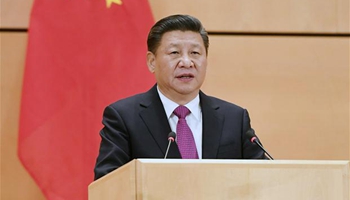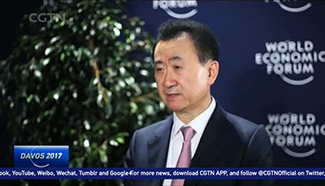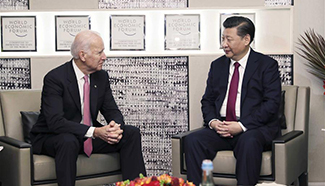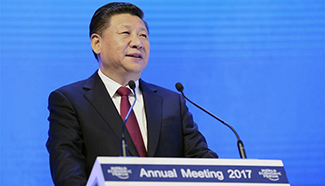ISTANBUL, Jan. 19 (Xinhua) -- The Turkish government's recent move to grant citizenship to foreigners who invest and buy properties in Turkey would not go far in terms of reviving the ailing economy, analysts said.
"A step taken, so to speak, in panic to encourage the inflow of foreign currency is not a step to be taken seriously," Aziz Konukman, a professor of economics with Gazi University in Ankara, told Xinhua.
According to a government decree that went into effect last week, Turkey will confer citizenship to foreigners who buy properties worth at least 1 million U.S. dollars on condition that they do not sell them in three years.
Foreigners investing a minimum of 2 million dollars or depositing at least 3 million dollars in a Turkish bank for more than three years will also be entitled to become Turkish citizens.
"The government feels so much in trouble (financially) that it sees such a step as a sort of lifeline for the economy, but you can't produce a lasting solution in this manner," argued Konukman.
Turkey needs to pay as much as almost 165 billion dollars in foreign loans this year. Additionally, it must also get from international lenders around 32 billion dollars to make up for the current account deficit estimated for 2017.
"Paying loans as high as 200 billion dollars, that's the question," stressed Konukman, adding that a huge economic crisis may ensue should Turkey fail to find enough money from international lenders to pay off its debt.
The Turkish Central Bank has a net reserve of 34.7 billion dollars, including reserves in gold, Faik Oztrak, a deputy from the main opposition Republican People's Party (CHP), said in parliament last weekend.
He then added, "This means Turkey can only make do (with the money in reserve) for two months if no money is found from outside."
Alarm bells have been ringing louder for the economy since the end of September when the Turkish lira began to plummet in value against the dollar. The lira has depreciated by around 25 percent since then.
Top Turkish officials have mainly blamed the manipulators for the sharp fall in the lira, which they argued is not a necessary result of Turkey's economic figures.
While claiming the Turkish economy has been under attack since 2013, President Recep Tayyip Erdogan has called on banks to lower interest rates to boost investments.
Many, however, feel Turkey's Central Bank should increase interest rates instead to stem the hike in the dollar and stabilize the economy before it is too late.
Unless action is taken now, even an increase of 4-5 percentage points in interest rates in the future may not suffice to save the situation, Ufuk Soylemez, who served as a minister in charge of economy, warned on Ulusal TV on Sunday.
Seyfettin Gursel, director of the Bahcesehir University Center for Economic and Social Research (BETAM), does not expect the government's citizenship plan to boost the economy in a significant way.
The additional foreign currency the government's move is expected to draw would not help in a major way to eliminate the country's current account deficit, but would only help the construction industry rid of its stock in luxury housing, he told Xinhua.
The government, however, is optimistic that the citizenship bill may attract a substantial sum in foreign capital, thanks largely to the presence of Syrian refugees in Turkey.
According to Deputy Prime Minister Veysi Kaynak, 22,000 Syrian families in Turkey are financially in a position to invest 2 million dollars each and obtain citizenship.
The Hurriyet daily news also quoted Kaynak as saying that almost 1,000 families from other nationalities are expected to apply for Turkish citizenship.
According to official figures, Turkey currently hosts around 2.8 million Syrians who fled their war-torn country.
The number of properties purchased by foreigners in Turkey last year is expected to have fallen by around 20 percent year-on-year.
According to reports in local media, foreigners bought 23,000 properties in 2015 for around 5 billion dollars, while some estimate the figure to be around 4 billion dollars.
"If citizenship is granted to foreigners who buy property in Turkey, our sector may reach 10 billion dollars at least in (yearly) sales to them," the Hurriyet daily news quoted Murat Kurum, CEO of the Emlak Konut Real Estate Investment Company, as saying back in November.
The Turkish economy shrank, for the first time since 2009, by 1.8 percent year-on-year in the third quarter of last year.
Turkey also suffers from a chronic current account deficit which is expected to amount to around 33 billion dollars in 2016.
According to latest official figures, the rate of unemployment rose to 11.8 percent in October 2016, the highest since 2010. The rise is an indication that the slowdown in the economy is set to continue.
"Turkey is on the verge of an economic crisis," former minister Soylemez said on TV.
The Turkish government has long been criticized for adopting an economic model that favors the construction sector instead of industrial production to boost economic growth.
Some are concerned that the country is confronted with the risk of a housing bubble as well as a real sector crisis. In both cases, the banking sector would get negatively affected.
Last month, Fitch Ratings revised the outlook for 2017 for the Turkish banking sector from stable to negative. The credit ratings agency may, many fear, also downgrade Turkey's credit rating, as Moody's did last September, to non-investment grade in a meeting at the end of this month.
The Turkish private sector has a foreign exchange gap of around 210 billion dollars, which is almost 30 percent of the country's estimated gross domestic product of around 700 billion dollars.
With a serious threat of terrorist attacks and geopolitical risks lingering due to Ankara's military engagement in Syria and rising political tension at home, Turkey has no appeal to foreign investors, argued Soylemez.
In addition, the Turkish government has been much criticized in recent years for having become authoritarian and for cracking down on the media and dissidents, which, according to many, has caused the country to lose its appeal.
The ruling party's push to replace the country's parliamentarian system with an executive presidency which, the opposition says, will lead to a one-man rule and further raise the polarization in society.
Both Gursel and Konukman think people mainly from Arab countries would find it attractive to buy a house in Turkey. Citizens of Iraq, Saudi Arabia, Kuwait and Russia constituted the majority of foreigners who bought property in Turkey last year.
Noting that Turkish citizenship needs to be appealing for housing sales to foreigners to sharply rise, BETAM'S Gursel remarked, "For Westerners, there is no appeal in obtaining Turkish citizenship."
"Why should anybody want to become a citizen of a country where freedoms are repressed, journalists are in prison?" Konukman demanded, noting many Syrian refugees also left Turkey for Europe in past years.
The year 2016 saw in Turkey an attempted military coup, many deadly terrorist attacks in cities and an extremely high polarization in society along the secularist and Islamist fault line.
The economy, which grew by 4 percent in 2015, is expected to grow around 3 percent if not less in 2016. The World Bank recently revised Turkey's growth expectation for 2017 down to 3 percent from 3.5 percent.
Turkey's total debt has increased by 155 billion liras (41.2 billion dollars) due to the depreciation in the Turkish currency, CHP spokesperson Selin Sayek Boke said recently.
The country has a total foreign debt of over 400 billion dollars, around two thirds of which belong to the private sector.
While not expecting a major economic crisis unless serious mistakes are committed in the monatery policy, Gursel acknowledged a gloomy prospect facing the economy.
"The inflation is rising, the inflow of foreign capital is on the decrease while the low growth and rise in unemployment will apparently persist," he noted.














